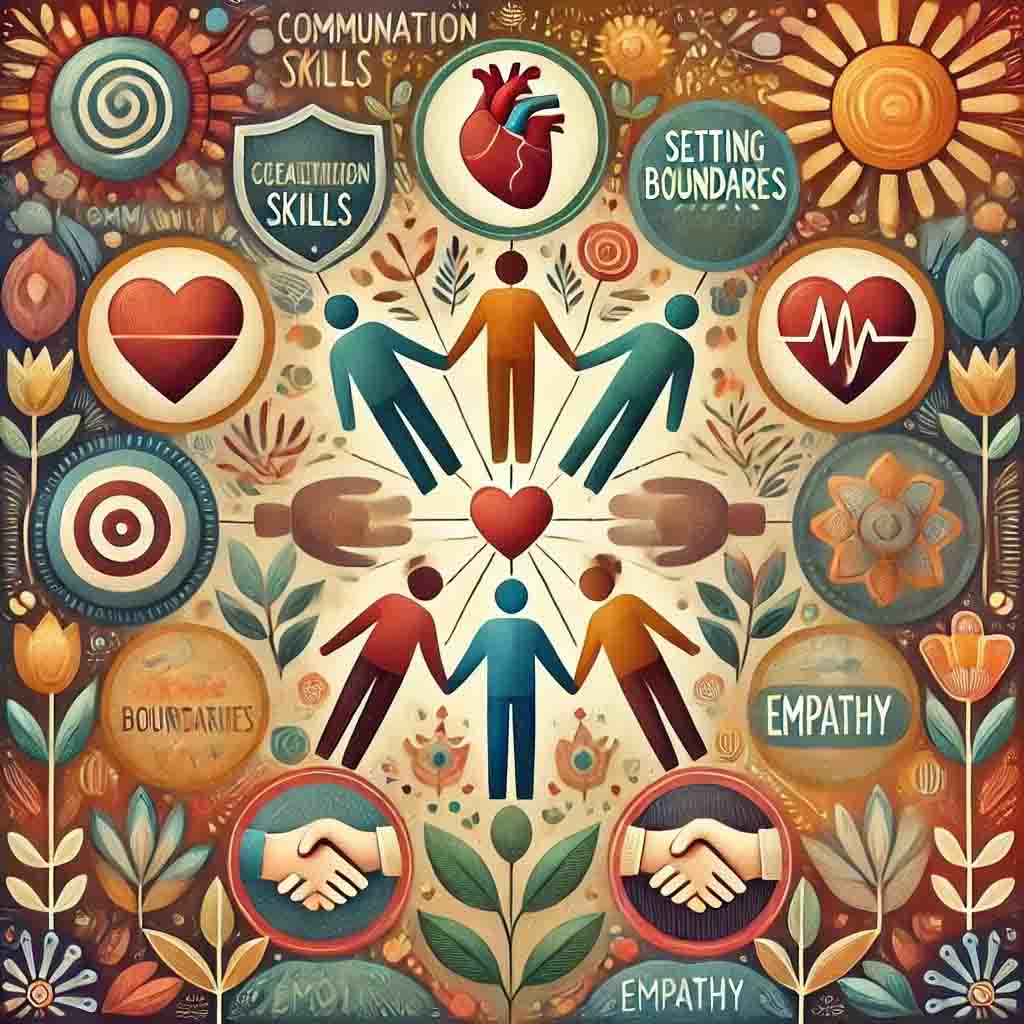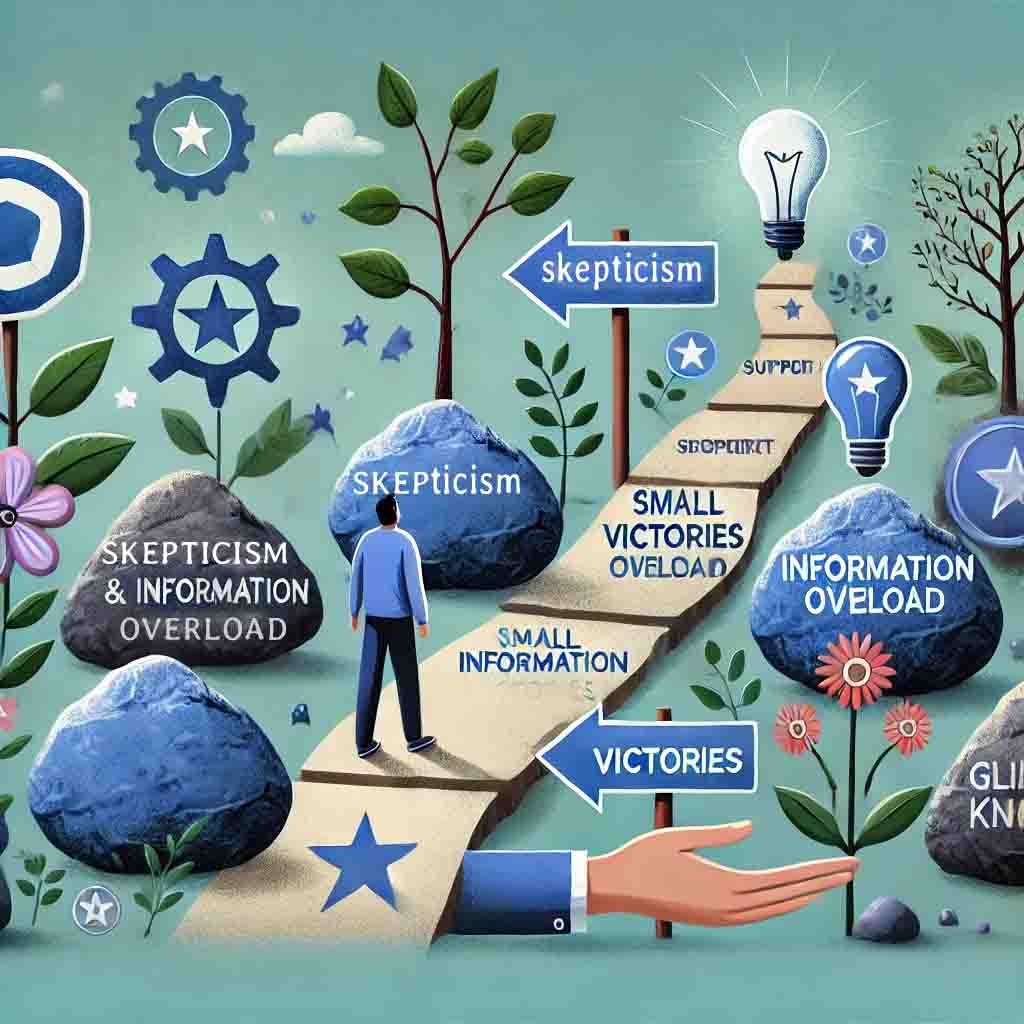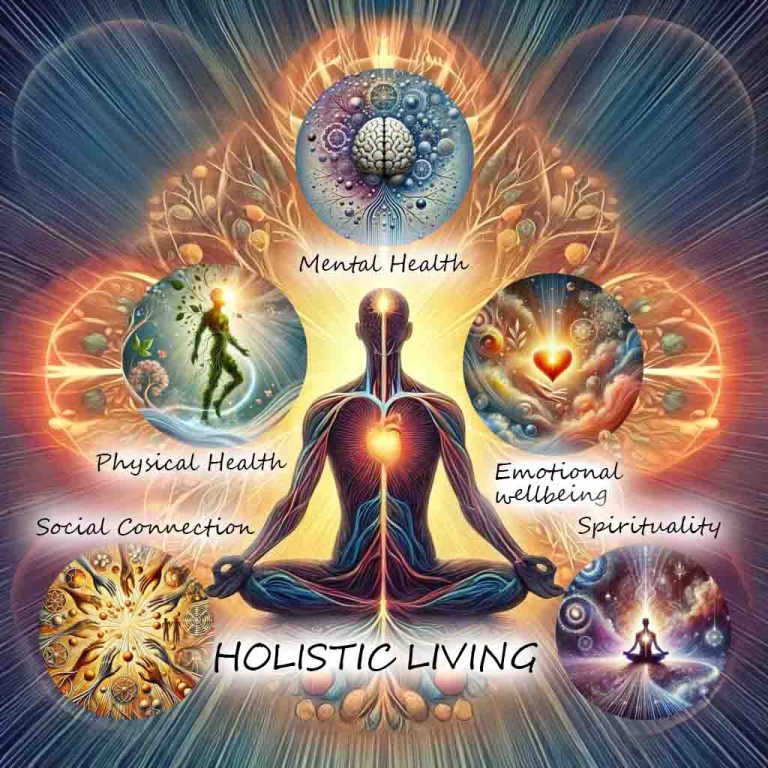Holistic Health 101: Building Your Wellness from the Ground Up
In today’s fast-paced world, where stress and chronic illnesses are on the rise, the concept of holistic health has gained a ton of traction. Holistic health is an approach to wellness that considers the whole person – body, mind, and spirit – as interconnected parts of a larger system. This comprehensive view of health goes beyond merely treating symptoms and instead focuses on achieving overall well-being through a balanced lifestyle.
The importance of holistic health in modern life cannot be overstated. As we face increasing challenges to our physical and mental health, from environmental toxins to digital overload, a holistic approach offers a path to resilience and vitality. By addressing all aspects of our being, we can create a foundation for lasting health and happiness.
The roots of holistic health can be traced back to ancient healing traditions from around the world. From Traditional Chinese Medicine to Ayurveda, these systems have long recognized the interconnectedness of mind, body, and spirit. In recent decades, there has been a resurgence of interest in these holistic approaches, as people seek alternatives to the often fragmented nature of modern healthcare.
The Foundations of Holistic Health
At the core of holistic health is the understanding that the human body is a complex system where all parts are interconnected. This systems thinking approach recognizes that a change in one area of our lives can have ripple effects throughout our entire being. For example, chronic stress can manifest as physical symptoms like headaches or digestive issues, while poor nutrition can impact our mental clarity and emotional stability. One of the key principles of holistic health is its focus on prevention rather than reaction. Instead of waiting for illness to strike, holistic health emphasizes proactive measures to maintain and enhance well-being. This preventive approach not only leads to better health outcomes but can also reduce healthcare costs in the long run.
The Five Pillars of Holistic Health

Holistic health is often described as resting on five interconnected pillars: physical, emotional, mental, social, and spiritual health. Each of these pillars plays a crucial role in our overall well-being, and neglecting any one of them can throw the entire system out of balance.
Physical Health
Physical health forms the foundation of holistic wellness, encompassing nutrition, exercise, sleep, and environmental factors.
- Nutrition and Diet: Focus on a balanced, whole-foods approach with diverse fruits, vegetables, whole grains, lean proteins, and healthy fats. Studies show proper nutrition can reduce healthcare costs related to chronic diseases by up to 75%.
- Exercise and Movement: Incorporate 150 minutes of moderate-intensity exercise weekly, combining cardiovascular activities, strength training, and flexibility work. This approach can reduce cardiovascular disease risks by 20-30%.
- Sleep and Rest: Prioritize 7-9 hours of quality sleep nightly. Research indicates that sleeping less than 6 hours increases heart disease risk by 48%. Create a consistent sleep schedule and optimized sleep environment.
- Environmental Wellness: Minimize exposure to toxins through natural products and filtered water. Regular outdoor activity promotes both physical and mental well-being.
Dive deeper into Mastering Physical Wellness → Master Physical Wellness: The Ultimate Health Guide
Emotional Health
Emotional well-being fundamentally shapes our ability to navigate life’s challenges and build meaningful relationships. Research shows that individuals with high emotional intelligence experience 50% lower stress levels and 30% stronger relationships.
- Emotional Intelligence: Master the five core components: self-awareness, self-regulation, motivation, empathy, and social skills. Practice reflective journaling and mindfulness to better understand and manage your emotions.
- Stress Management: Implement evidence-based techniques like mindfulness meditation, cognitive reframing, and physical exercise. Studies indicate these practices can significantly reduce anxiety and depression symptoms.
- Resilience Building: Develop emotional strength through active listening, perspective-taking, and regular emotional check-ins. These practices foster deeper connections and enhance both personal and professional growth.
Master Emotional Intelligence (EI) for inner peace → – 5 Core Components to Master Emotional Intelligence for Inner Peace and Personal Growth
Mental Health
Research shows that maintaining cognitive health requires a multi-faceted approach encompassing mental stimulation, stress management, and continuous learning.
- Cognitive Function: Engage in brain-training activities and games that target different skills like memory, problem-solving, and spatial awareness. Studies indicate regular mental exercise can significantly enhance focus and mental clarity.
- Mental Performance: Optimize sleep (7-8 hours nightly), practice mindfulness meditation, and manage stress through physical activity. Research shows poor sleep can increase cognitive decline risks by up to 30%.
- Continuous Learning: Challenge yourself with new skills and hobbies. Whether learning a language, mastering SEO, or exploring gardening, novel experiences keep your mind sharp and promote neuroplasticity.
Boost Your Brain Power → Boosting Brain Power: Strategies for Peak Mental Performance
Social Health
Research shows individuals with strong social networks are 50% more likely to enjoy longer, happier lives. Building meaningful social connections requires intentional effort across multiple dimensions:
- Relationship Building: Invest time in regular check-ins and shared activities. Studies indicate consistent communication and mutual support are key foundations for lasting connections.
- Emotional Intelligence: Practice self-awareness, empathy, and active listening. High emotional intelligence correlates with both deeper personal relationships and enhanced professional success.
- Support Systems: Create a diverse network through community involvement, shared interests, and regular social engagement. Quality relationships provide crucial emotional support and stress reduction.
Master the Art of Building Relationships → The Art of Building Relationships: 7 Essential Tips
Spiritual Health
Research shows that 62% of people yearn for deeper spiritual well-being in today’s fast-paced world. Nurturing your spiritual health can enhance both emotional resilience and life satisfaction.
- Purpose and Practice: Incorporate daily spiritual practices that resonate with you, from meditation to nature walks. Studies indicate regular mindfulness practices lead to 30-40% reduced stress levels and increased mental clarity.
- Values and Connection: Align daily actions with core spiritual values through activities like volunteering, artistic expression, or community service. This alignment creates deeper meaning and authentic fulfillment beyond professional success.
- Modern Spirituality: Technology can enhance rather than hinder spiritual growth. From meditation apps to online communities, find tools that help you maintain spiritual practices within busy schedules.
Explore Spiritual Growth → Spiritual Growth – Finding Meaning in an Age of Chaos
The Interplay Between the Five Pillars
The five pillars of holistic health are deeply interconnected, with each aspect influencing and being influenced by the others. Understanding these connections can help us create a more balanced approach to our overall well-being. Physical health has a profound impact on mental and emotional well-being. Regular exercise, for example, has been shown to reduce symptoms of depression and anxiety, improve cognitive function, and boost self-esteem. Conversely, poor physical health can lead to increased stress, negative emotions, and reduced mental clarity.
Social connections play a crucial role in overall health. Strong social support has been linked to better immune function, lower rates of depression, and even increased longevity. Our relationships can provide emotional support, practical assistance, and a sense of belonging that contributes to all aspects of our well-being. Spiritual health can serve as a foundation for resilience in the face of life’s challenges. A strong sense of purpose and connection to something greater than oneself can provide comfort during difficult times and contribute to overall life satisfaction. To illustrate the interconnectedness of these pillars, consider the following case studies:
- Stephanie, a 35-year-old marketing executive, was experiencing chronic stress and fatigue. By addressing her physical health through improved nutrition and regular exercise, she found that her mental clarity improved, her emotional resilience increased, and she had more energy for social activities. This holistic approach led to better performance at work and improved overall life satisfaction.
- John, a 50-year-old teacher, was struggling with feelings of isolation and depression. By focusing on building his social connections through community volunteering and joining a local hiking group, he not only improved his emotional and mental health but also increased his physical activity levels. This social engagement also gave him a renewed sense of purpose, enhancing his spiritual well-being.
These examples demonstrate how improvements in one area of holistic health can create positive ripple effects throughout all aspects of a person’s life.
Holistic Health Assessment

To begin your journey towards holistic health, it’s essential to assess your current state of well-being across all five pillars. This assessment can help you identify areas for improvement and set realistic goals.
Self-assessment tools
There are numerous self-assessment tools available that can help you evaluate different aspects of your holistic health:
- The Wheel of Life: This visual tool helps you rate your satisfaction in various life areas, providing a quick overview of where you might need to focus your efforts.
- The Holistic Health Questionnaire: This comprehensive survey covers all five pillars of holistic health, helping you identify strengths and areas for improvement.
- The Perceived Stress Scale: This widely used psychological instrument measures your perception of stress, which can impact all areas of holistic health.
- The Spiritual Well-Being Scale: This assessment tool measures both religious and existential well-being, providing insights into your spiritual health.
Professional holistic health evaluations
While self-assessments are valuable, working with a holistic health practitioner can provide deeper insights and personalized guidance.
These professionals may include:
- Naturopathic doctors
- Integrative medicine physicians
- Holistic nutritionists
- Mind-body therapists
- Wellness coaches
A professional evaluation might include:
- A comprehensive health history
- Physical examinations
- Laboratory tests (e.g., blood work, hormone panels)
- Lifestyle assessments
- Emotional and mental health screenings
- Spiritual well-being evaluations
Identifying areas for improvement
Based on your self-assessment and professional evaluation, you can identify specific areas that need attention.
These might include:
- Improving sleep quality and quantity
- Enhancing stress management techniques
- Addressing nutritional deficiencies
- Increasing physical activity levels
- Strengthening social connections
- Developing a regular mindfulness practice
- Clarifying personal values and life purpose
Remember that holistic health is a journey, not a destination. Regular reassessment and adjustment of your goals and strategies are key to maintaining and improving your overall well-being.
Creating a Holistic Health Plan
Once you’ve assessed your current state of holistic health, the next step is to create a personalized plan for improvement. This plan should address all five pillars of holistic health and be tailored to your unique needs, preferences, and lifestyle.
Setting realistic goals
When setting goals for your holistic health journey, it’s important to make them SMART: Specific, Measurable, Achievable, Relevant, and Time-bound.
For example:
- Physical health: “I will engage in 30 minutes of moderate-intensity exercise 5 days a week for the next 3 months.”
- Emotional health: “I will practice mindfulness meditation for 10 minutes daily for the next month.”
- Mental health: “I will read one personal development book per month for the next 6 months.”
- Social health: “I will schedule a social activity with friends or family at least once a week for the next 2 months.”
- Spiritual health: “I will spend 15 minutes each morning journaling about my values and life purpose for the next month.”
Developing daily routines
Incorporating holistic health practices into your daily routine can help make them sustainable habits.
Consider creating:
- A morning routine that includes activities like meditation, journaling, or gentle stretching.
- A bedtime routine that promotes relaxation and good sleep hygiene.
- Regular meal times with an emphasis on mindful eating.
- Scheduled breaks throughout the day for movement, deep breathing, or social connection.
Incorporating mindfulness practices
Mindfulness can be a powerful tool for enhancing all aspects of holistic health. Some ways to incorporate mindfulness into your daily life include:
- Practicing mindful eating by savoring each bite and paying attention to hunger and fullness cues.
- Using mindful breathing techniques during stressful moments.
- Engaging in body scan meditations to increase body awareness.
- Practicing gratitude by regularly noting things you’re thankful for.
Balancing different aspects of health
Achieving balance among the five pillars of holistic health is crucial.
This might involve:
- Allocating time and energy to each pillar in your weekly schedule.
- Recognizing when one area needs more attention and adjusting accordingly.
- Finding activities that address multiple pillars simultaneously (e.g., joining a hiking group for physical, social, and spiritual benefits).
- Regularly reassessing your balance and making adjustments as needed.
Remember that creating a holistic health plan is an ongoing process. Be patient with yourself and willing to adjust your plan as you learn what works best for you.
Holistic Approaches to Common Health Concerns
Holistic health offers a unique perspective on addressing common health issues by considering the interconnectedness of various aspects of well-being. Here are some holistic approaches to common health concerns:
Stress and anxiety
- Mind-body techniques: Practice meditation, deep breathing exercises, or progressive muscle relaxation to calm the nervous system.
- Herbal remedies: Consider adaptogens like ashwagandha or rhodiola to help the body manage stress.
- Exercise: Engage in regular physical activity, which can help reduce stress and anxiety symptoms.
- Nutrition: Focus on a balanced diet rich in omega-3 fatty acids, complex carbohydrates, and antioxidants to support mental health.
- Social support: Cultivate strong relationships and seek support from friends, family, or support groups.
Chronic pain
- Mind-body practices: Try tai chi, yoga, or qigong to improve flexibility, strength, and body awareness.
- Acupuncture: This traditional Chinese medicine technique may help alleviate various types of chronic pain.
- Anti-inflammatory diet: Incorporate foods rich in omega-3 fatty acids, turmeric, and ginger to help reduce inflammation.
- Stress reduction: Practice stress management techniques, as stress can exacerbate pain perception.
- Sleep hygiene: Prioritize good sleep habits, as poor sleep can worsen pain symptoms.
Digestive issues
- Mindful eating: Practice eating slowly and attentively to improve digestion and reduce symptoms.
- Probiotics and prebiotics: Incorporate fermented foods and fiber-rich foods to support gut health.
- Stress management: Reduce stress through relaxation techniques, as stress can impact digestive function.
- Herbal remedies: Consider herbs like peppermint, ginger, or chamomile to soothe digestive discomfort.
- Food sensitivities: Identify and eliminate potential trigger foods through an elimination diet or food sensitivity testing.
Sleep disorders
- Sleep hygiene: Establish a consistent sleep schedule and create a relaxing bedtime routine.
- Light therapy: Expose yourself to natural light during the day to regulate your circadian rhythm.
- Relaxation techniques: Practice progressive muscle relaxation or guided imagery before bed.
- Herbal remedies: Consider calming herbs like valerian root, passionflower, or chamomile.
- Cognitive Behavioral Therapy for Insomnia (CBT-I): This therapy can help address underlying thought patterns that contribute to sleep issues.
Immune system support
- Nutrition: Consume a diet rich in fruits, vegetables, and whole foods to provide essential nutrients for immune function.
- Exercise: Engage in regular moderate exercise to boost immune system activity.
- Stress management: Practice stress reduction techniques, as chronic stress can suppress immune function.
- Sleep: Prioritize getting adequate sleep, as sleep deprivation can weaken the immune system.
- Herbal support: Consider immune-boosting herbs like echinacea, elderberry, or astragalus.
By addressing these common health concerns through a holistic lens, you can work towards not just alleviating symptoms but improving your overall well-being. Remember to consult with healthcare professionals before making significant changes to your health regimen, especially if you have existing medical conditions or are taking medications.
The Role of Alternative and Complementary Therapies

Alternative and complementary therapies play a significant role in holistic health, offering diverse approaches to wellness that can complement conventional medical treatments. These therapies often focus on the body’s innate healing abilities and the interconnectedness of mind, body, and spirit.
Acupuncture and Traditional Chinese Medicine (TCM)
Acupuncture, a key component of TCM, involves inserting thin needles into specific points on the body to balance the flow of energy or life force known as “qi”. TCM also incorporates herbal medicine, dietary therapy, and practices like cupping and moxibustion.
Benefits:
- Pain relief
- Stress reduction
- Improved sleep quality
- Support for various chronic conditions
Ayurveda
Ayurveda is an ancient Indian healing system that emphasizes balance between mind, body, and spirit. It categorizes individuals into different doshas (body types) and recommends personalized lifestyle and dietary practices.
Key aspects:
- Personalized diet and lifestyle recommendations
- Herbal remedies
- Detoxification practices (panchakarma)
- Yoga and meditation
Naturopathy
Naturopathy is a system of medicine that emphasizes the body’s inherent ability to heal itself. It combines traditional healing methods with modern scientific knowledge to promote overall wellness.
Key principles:
- Focus on treating the root cause of illness, not just symptoms
- Use of natural remedies and therapies
- Emphasis on prevention and patient education
- Individualized treatment plans
Common naturopathic treatments include dietary changes, herbal medicine, hydrotherapy, and lifestyle counseling.
Chiropractic Care
Chiropractic care focuses on the relationship between the body’s structure (primarily the spine) and its function. Chiropractors use manual adjustments to improve joint mobility and alleviate pain.
Benefits:
- Relief from back and neck pain
- Improved posture
- Enhanced athletic performance
- Potential reduction in headaches
Chiropractors may also provide advice on exercise, nutrition, and lifestyle changes to support overall health.
Herbal Medicine
Herbal medicine involves the use of plants and plant extracts for therapeutic purposes. This ancient practice is found in many traditional healing systems and is gaining recognition in modern healthcare.
Key aspects:
- Wide variety of herbs with different properties and uses
- Can be used in various forms (teas, tinctures, capsules, etc.)
- Often used to support overall health and address specific conditions
- Potential for interactions with conventional medications
It’s crucial to consult with a qualified herbalist or healthcare provider before using herbal remedies, especially if you’re taking other medications.
Nutrition in Holistic Health

Nutrition plays a fundamental role in holistic health, providing the building blocks for physical health and influencing mental and emotional well-being.
Whole Foods Approach
A whole foods approach emphasizes consuming foods in their natural, unprocessed state. This method provides a wide range of nutrients and reduces exposure to artificial additives.
Key principles:
- Choose fresh fruits and vegetables over canned or processed options
- Opt for whole grains instead of refined grains
- Include a variety of lean proteins, including plant-based sources
- Minimize consumption of packaged and processed foods
Benefits of a whole foods diet include improved digestion, better weight management, and reduced risk of chronic diseases.
Personalized Nutrition
Personalized nutrition recognizes that each individual has unique nutritional needs based on factors such as genetics, lifestyle, and health status.
Approaches to personalized nutrition:
- Genetic testing to identify potential nutrient needs or sensitivities
- Food sensitivity testing to identify problematic foods
- Analysis of gut microbiome to optimize digestive health
- Consideration of personal health goals and preferences
Working with a nutritionist or dietitian can help develop a personalized nutrition plan that supports your holistic health goals.
Mindful Eating Practices
Mindful eating involves paying full attention to the experience of eating and drinking, both inside and outside the body. This practice can improve digestion, reduce overeating, and enhance the enjoyment of food.
Mindful eating techniques:
- Eat slowly and without distraction
- Listen to physical hunger cues and eat only until you feel full
- Engage all senses while eating
- Notice the effects different foods have on your body and mood
The Gut-Brain Connection
The gut-brain connection refers to the bidirectional communication between the gastrointestinal tract and the central nervous system. This connection plays a crucial role in both physical and mental health.
Key points:
- The gut produces many of the same neurotransmitters found in the brain
- Gut health can influence mood, cognition, and mental health
- Stress can affect gut function and the composition of gut bacteria
- A healthy diet and probiotics can support both gut and brain health
Understanding this connection highlights the importance of gut health in a holistic approach to wellness.
Movement and Exercise in Holistic Health
Physical activity is a cornerstone of holistic health, contributing to physical fitness, mental clarity, and emotional well-being.
Finding Joy in Movement
Enjoying physical activity is key to maintaining a consistent exercise routine.
This might involve:
- Exploring different types of exercise to find what you enjoy
- Setting achievable goals to build confidence and motivation
- Focusing on how exercise makes you feel, rather than just physical results
- Incorporating play and social interaction into your fitness routine
Mind-Body Exercises
Mind-body exercises combine physical movement with mental focus and controlled breathing. These practices can improve flexibility, strength, balance, and mental well-being.
Popular mind-body exercises include:
- Yoga: Combines physical postures, breathing techniques, and meditation
- Tai Chi: A gentle Chinese martial art focusing on flowing movements and breath control
- Qigong: Involves coordinated body posture, movement, breathing, and meditation
These practices not only provide physical benefits but also help reduce stress and improve mind-body awareness.
Functional Fitness
Functional fitness focuses on exercises that mimic everyday activities, improving your ability to perform daily tasks and reducing the risk of injury.
Key aspects of functional fitness:
- Multi-joint movements that work several muscle groups simultaneously
- Emphasis on core strength and stability
- Incorporation of balance and coordination exercises
- Use of bodyweight exercises and free weights over machines
Functional fitness can be particularly beneficial for maintaining independence and quality of life as we age.
The Importance of Rest and Recovery
While regular exercise is crucial, adequate rest and recovery are equally important for holistic health. Proper recovery allows the body to repair and strengthen itself between workouts.
Recovery strategies include:
- Getting adequate sleep (7-9 hours for most adults)
- Incorporating rest days into your exercise routine
- Practicing active recovery (light exercise) on rest days
- Using techniques like foam rolling or massage to aid muscle recovery
Balancing exercise with proper rest can help prevent burnout, reduce the risk of injury, and improve overall performance and well-being.
The Mind-Body Connection

The mind-body connection is a fundamental concept in holistic health, recognizing the profound impact that our thoughts and emotions can have on our physical health, and vice versa.
Psychoneuroimmunology
Psychoneuroimmunology (PNI) is the study of how psychological processes interact with the nervous and immune systems. This field explores how stress, emotions, and other psychological factors can influence physical health.
Key findings in PNI:
- Chronic stress can suppress immune function
- Positive emotions can boost immune response
- Social support can improve health outcomes
- Mindfulness practices can reduce inflammation
Understanding PNI highlights the importance of addressing mental and emotional health as part of overall wellness.
The Impact of Thoughts on Physical Health
Our thoughts and beliefs can have a significant impact on our physical health. This concept, often referred to as the “placebo effect,” demonstrates the power of the mind to influence bodily processes.
Examples of thought impact on health:
- Positive expectations can enhance treatment outcomes
- Negative self-talk can increase stress and physical tension
- Catastrophizing pain can make it feel more intense
- Belief in one’s ability to heal can support recovery
Cultivating positive thought patterns and beliefs can be a powerful tool in promoting overall health and well-being.
Meditation and Its Effects on the Body
Meditation is a practice that involves focusing the mind to achieve a state of calm and clarity. Regular meditation has been shown to have numerous physical and mental health benefits.
Effects of meditation on the body:
- Reduces stress and anxiety
- Lowers blood pressure
- Improves immune function
- Enhances sleep quality
- Increases gray matter in the brain
Different types of meditation, such as mindfulness meditation, loving-kindness meditation, and transcendental meditation, may offer unique benefits.
Visualization and Healing
Visualization, also known as guided imagery, involves using mental images to promote relaxation and healing. This technique can be a powerful complement to other healing practices.
Applications of visualization:
- Pain management
- Stress reduction
- Preparation for medical procedures
- Support for cancer treatment
- Enhancement of athletic performance
While visualization should not replace medical treatment, it can be a valuable tool in a holistic approach to health and healing.
Building Emotional Resilience
Emotional resilience is the ability to adapt to stressful situations and bounce back from adversity. It’s a crucial component of holistic health, influencing both mental and physical well-being.
Emotional Regulation Techniques
Emotional regulation involves managing and responding to an emotional experience. Developing these skills can help reduce stress and improve overall emotional well-being.
Effective techniques include:
- Deep breathing exercises
- Progressive muscle relaxation
- Mindfulness practices
- Cognitive reframing
- Journaling
Regular practice of these techniques can help build emotional resilience over time.
The Power of Positive Psychology
Positive psychology focuses on cultivating positive emotions, experiences, and character traits. This approach can enhance overall well-being and resilience.
Key concepts in positive psychology:
- Gratitude practice
- Identifying and using personal strengths
- Cultivating optimism
- Building meaningful relationships
- Engaging in flow activities
Incorporating positive psychology principles into daily life can lead to greater life satisfaction and emotional resilience.
Coping Strategies for Life’s Challenges
Developing effective coping strategies is essential for navigating life’s inevitable challenges. These strategies can help manage stress and maintain emotional balance.
Healthy coping strategies include:
- Seeking social support
- Engaging in physical activity
- Practicing mindfulness or meditation
- Using problem-solving techniques
- Engaging in creative activities
It’s important to develop a variety of coping strategies to handle different types of challenges.
The Role of Therapy in Holistic Health
Professional therapy can play a crucial role in building emotional resilience and addressing mental health concerns. Various types of therapy can support holistic health:
- Cognitive Behavioral Therapy (CBT)
- Mindfulness-Based Stress Reduction (MBSR)
- Acceptance and Commitment Therapy (ACT)
- Psychodynamic therapy
- Holistic or integrative therapy approaches
Working with a therapist can provide personalized strategies for emotional regulation, stress management, and overall mental well-being.
Fostering Healthy Relationships

Healthy relationships are a vital component of holistic health, contributing to emotional well-being, stress reduction, and overall life satisfaction.
Communication Skills for Better Connections
Effective communication is the foundation of healthy relationships.
Key skills include:
- Active listening: Fully focusing on and understanding the speaker
- Assertiveness: Expressing needs and feelings clearly and respectfully
- Empathy: Understanding and sharing the feelings of others
- Non-verbal communication: Being aware of body language and tone
Practicing these skills can lead to more meaningful and satisfying relationships.
Setting Boundaries
Healthy boundaries are essential for maintaining balanced relationships and personal well-being.
This involves:
- Identifying personal limits and values
- Communicating boundaries clearly and consistently
- Respecting others’ boundaries
- Learning to say “no” when necessary
Setting and maintaining healthy boundaries can reduce stress and improve relationship quality.
Cultivating Empathy and Compassion
Empathy and compassion are crucial for building strong, supportive relationships. Practices to develop these qualities include:
- Perspective-taking exercises
- Loving-kindness meditation
- Volunteering or community service
- Practicing active listening
- Cultivating self-compassion
Developing empathy and compassion can lead to more fulfilling relationships and a greater sense of connection.
The Health Benefits of Strong Social Ties
Strong social connections have numerous health benefits, including:
- Reduced stress levels
- Improved immune function
- Lower risk of depression and anxiety
- Increased longevity
- Better cognitive function as we age
Prioritizing and nurturing social relationships is an important aspect of holistic health.
Spiritual Growth and Well-being
Spiritual health, often overlooked in traditional healthcare, plays a significant role in overall well-being. It involves finding meaning, purpose, and connection in life.
Defining Personal Values and Beliefs
Clarifying personal values and beliefs can provide a sense of direction and purpose.
This process might involve:
- Reflecting on what’s most important in life
- Identifying core values and principles
- Exploring different philosophical or spiritual traditions
- Considering how values align with daily actions and decisions
Having a clear sense of personal values can guide decision-making and contribute to a sense of authenticity and fulfillment.
Practices for Spiritual Connection
Various practices can foster spiritual connection, regardless of religious affiliation:
- Meditation or prayer
- Spending time in nature
- Engaging in creative activities
- Practicing mindfulness
- Participating in rituals or ceremonies
These practices can provide a sense of peace, connection, and transcendence.
Finding Purpose and Meaning in Daily Life
Discovering and pursuing a sense of purpose can greatly enhance well-being.
Strategies include:
- Identifying personal passions and interests
- Setting meaningful goals
- Engaging in activities that feel purposeful
- Reflecting on personal strengths and how to use them
- Considering how to contribute to something larger than oneself
A sense of purpose can provide motivation, resilience, and a deeper sense of life satisfaction.
The Role of Gratitude in Holistic Health
Gratitude practice has been shown to have numerous benefits for mental, emotional, and even physical health.
Ways to cultivate gratitude include:
- Keeping a gratitude journal
- Expressing appreciation to others
- Mindfully savoring positive experiences
- Reframing challenges as opportunities for growth
- Practicing gratitude meditation
Regular gratitude practice can lead to increased happiness, reduced stress, and improved overall well-being.
Environmental Factors in Holistic Health

The environment in which we live, work, and play has a significant impact on our health and well-being. Addressing environmental factors is crucial for a truly holistic approach to health.
Creating a Healthy Home Environment
Our homes should be sanctuaries that support our health.
Key considerations include:
- Improving indoor air quality through proper ventilation and air purification
- Using non-toxic cleaning products and personal care items
- Reducing electromagnetic field (EMF) exposure
- Creating spaces for relaxation and restful sleep
- Incorporating plants for improved air quality and connection to nature
A healthy home environment can support better sleep, reduced stress, and overall improved health.
Reducing Exposure to Toxins
In our modern world, we’re exposed to numerous environmental toxins that can impact our health.
Steps to reduce exposure include:
- Choosing organic foods when possible to reduce pesticide exposure
- Filtering drinking water to remove contaminants
- Using natural personal care products to avoid harmful chemicals
- Being mindful of air pollution and taking steps to minimize exposure
- Choosing non-toxic materials for home furnishings and renovations
Reducing toxic load can support the body’s natural detoxification processes and overall health.
The Healing Power of Nature
Spending time in nature has been shown to have numerous health benefits, including:
- Reduced stress and anxiety
- Improved mood and cognitive function
- Enhanced immune function
- Lower blood pressure
- Increased vitamin D levels from sun exposure
Incorporating regular time in nature, whether through outdoor activities, gardening, or simply sitting in a park, can significantly contribute to holistic health.
Sustainable Living for Personal and Planetary Health
Our individual health is intimately connected to the health of our planet. Sustainable living practices that benefit both include:
- Adopting a plant-based or plant-rich diet
- Reducing waste through recycling, composting, and mindful consumption
- Using energy-efficient appliances and renewable energy sources
- Choosing sustainable transportation options
- Supporting local and sustainable businesses
By making choices that support environmental health, we also support our own well-being and that of future generations.
Integrating Holistic Health into Daily Life
Incorporating holistic health principles into daily life is key to experiencing their full benefits. This integration involves creating routines and habits that support overall well-being.
Morning and Evening Routines
Establishing consistent routines can set a positive tone for the day and promote restful sleep at night.
Morning routine ideas:
- Start with a glass of water to hydrate
- Practice meditation or gentle stretching
- Enjoy a nutritious breakfast
- Set intentions for the day
Evening routine ideas:
- Engage in a relaxing activity like reading or gentle yoga
- Practice gratitude reflection
- Limit screen time before bed
- Create a comfortable sleep environment
Mindful Technology Use
While technology offers many benefits, mindful use is crucial for maintaining balance and well-being.
Strategies for mindful technology use:
- Set boundaries for device use, especially before bedtime
- Take regular breaks from screens throughout the day
- Use apps that promote well-being, such as meditation or fitness trackers
- Practice digital detoxes periodically
Work-Life Balance Strategies
Maintaining a healthy work-life balance is essential for overall well-being.
Tips for better work-life balance:
- Set clear boundaries between work and personal time
- Prioritize self-care and leisure activities
- Practice time management techniques
- Learn to delegate and say no when necessary
- Make time for hobbies and social connections
Holistic Approaches to Common Daily Challenges
Applying holistic health principles can help navigate everyday challenges more effectively.
Examples:
- Using deep breathing techniques to manage stress in traffic
- Choosing nutrient-dense snacks to maintain energy throughout the day
- Taking short movement breaks during long periods of sitting
- Practicing mindfulness during routine activities like eating or walking
By integrating holistic health practices into daily life, they become habits that support overall well-being.
Overcoming Obstacles to Holistic Health

Adopting a holistic approach to health can present challenges, but understanding and addressing common obstacles can help maintain progress and motivation.
Addressing Skepticism and Misconceptions
Skepticism about holistic health practices often stems from misconceptions or lack of information.
To address this:
- Educate yourself using evidence-based resources
- Share personal experiences and success stories
- Encourage open-minded exploration of different approaches
- Acknowledge the complementary role of conventional and holistic practices
Navigating Information Overload
The abundance of health information available can be overwhelming.
To manage this:
- Focus on reputable sources and peer-reviewed research
- Consult with qualified healthcare professionals
- Be critical of extreme claims or quick-fix solutions
- Start with small, manageable changes rather than overhauling everything at once
Dealing with Setbacks and Maintaining Motivation
Setbacks are a normal part of any health journey.
To maintain motivation:
- Set realistic, achievable goals
- Celebrate small victories along the way
- Practice self-compassion when facing challenges
- Find an accountability partner or support group
- Regularly remind yourself of your “why” – the reasons behind your health journey
Finding Support and Resources
Having access to the right support and resources can significantly impact your holistic health journey.
Consider:
- Joining local or online holistic health communities
- Seeking out holistic health practitioners in your area
- Exploring workshops, classes, or retreats focused on holistic health
- Utilizing apps and online resources for tracking progress and learning new practices
The Future of Holistic Health

As our understanding of health and wellness evolves, the field of holistic health continues to develop and expand.
Emerging Research and Trends
Ongoing research is providing more evidence for the efficacy of holistic health practices.
Emerging areas of study include:
- The role of the microbiome in overall health
- Epigenetics and how lifestyle factors influence gene expression
- The impact of mindfulness practices on brain structure and function
- The potential of psychedelic-assisted therapies for mental health
Integration with Conventional Medicine
There’s a growing trend towards integrating holistic approaches with conventional medicine, including:
- Hospitals offering complementary therapies like acupuncture and massage
- Medical schools incorporating courses on nutrition and mindfulness
- Collaborative care models involving both conventional and holistic practitioners
- Insurance companies beginning to cover some alternative therapies
Personalized Holistic Health Approaches
The future of holistic health is likely to be increasingly personalized, taking into account individual factors:
- Genetic testing to inform dietary and lifestyle recommendations
- Wearable technology providing real-time health data
- AI-powered health coaching tailored to individual needs and preferences
- Personalized supplement regimens based on individual nutrient needs
Technology and Holistic Health
Technology is playing an increasingly important role in making holistic health practices more accessible and effective:
- Virtual reality for meditation and stress reduction
- Apps for tracking various aspects of health and wellness
- Telemedicine platforms connecting patients with holistic health practitioners
- Smart home technology supporting healthy sleep and reducing environmental toxins
Conclusion
Holistic health offers a comprehensive approach to wellness that considers the whole person – body, mind, and spirit. Key aspects include the interconnectedness of physical, emotional, mental, social, and spiritual health; the importance of preventive practices and lifestyle choices; the role of alternative and complementary therapies; the significance of nutrition, movement, and the mind-body connection; and the impact of relationships and environment on overall well-being.
Embarking on a holistic health journey is a powerful step towards improved well-being and quality of life. Remember that every small step counts, be patient with yourself, stay curious and open-minded, listen to your body, and seek support when needed. By embracing a holistic approach to health, you’re cultivating a life of balance, vitality, and fulfillment. The path of holistic health offers endless opportunities for growth, healing, and transformation. Trust the process, stay committed to your well-being, and enjoy the profound benefits that come from nurturing all aspects of your health.







